#i'm essay posting again
Text
Son of a Coma Guy: Unconditional Love is Cutting Your Heart Out
Son of a Coma Guy is leading up to the climax of the Tritter arc of House season 3, only two episodes before Finding Judas, where Wilson betrays House and makes a deal with Tritter, an action that ultimately dissolves their relationship until Season 4. The episode starts with a unique structure, with no patient cold open. Just House having lunch with two patients in comas. Wilson barges in and yells at House for “forcing him to lie to the police” that House didn't steal Wilson’s prescription pad and forge his Vicodin prescriptions. This is all in the first minute of the episode, setting up the intricacies of House and Wilson’s relationship that will soon get pushed in the later events of the season.
Wilson is characterized as a person who is selfless, giving, loves to be needed, and will do anything in his power to help people he cares about, especially House. House does something that should rightfully break this friendship: put Wilson’s career on the line and possibly send himself to prison. Wilson is mad at House for only thinking about himself and putting himself in jeopardy. Wilson isn’t mad at House for using him and his kindness. House always does this. Wilson likes being used. In reality, Wilson is scared for House, not himself. He lied to Tritter to protect House. House didn't force Wilson to lie for him. Wilson did it anyway. The ultimate act of loyalty and care, the ultimate sacrifice. This is all read between the lines, of course, and this important revelation in the opening of the episode sets up the actions and importance of Son of a Coma Guy.
We are then introduced to the titular Son of a Coma Guy, Kyle Wozniak, who has a seizure when House induces one. Kyle discusses his medical history and his family history. He says that his dad never liked his mother’s side of the family, and he was raised by a guardian. He only visits his father, who is in a coma. House wakes up his comatose father, Gabriel Wozniak. The last thing he remembers is the fire that killed his wife, something that is revealed to have been caused by Kyle later in the episode. House and Wilson discuss Gabriel. House argues, “Maybe he just doesn’t like his son. The delusion that fathering a child installs a permanent geyser of unconditional love.” Wilson interjects with, “Maybe your father’s feelings were conditional. Not everyone-” House cuts him off, “Yes, of course, that would play into your romantic vision of-” Wilson says, “In terms you would understand, we have an evolutionary incentive to sacrifice for our offspring. Our tribe, our friends. Keep them safe.” To which House replies, “Except for all the people who don’t. Everything is conditional. You just can’t always anticipate the conditions.” Wilson’s argument here mirrors his actions at the start of the episode, sacrificing himself and keeping House safe from the consequences of his actions, even if he deserves them. House says that maybe Gabriel’s relationship with Kyle is conditional, that love and sacrifice can never be unconditional. Referencing his abusive relationship with his father and his perception of love. That it always has to have a catch. This is really important in understand House and Wilson as characters, and especially in their relationship. Wilson views love as being programmed, an innate thing you’re evolutionarily destined to have. House views love as something you earn, something you get, something that has conditions. Wilson might have a romantic vision of love, but his love life is just as unhealthy as House’s. Constantly putting people’s needs in front of his own, sacrificing himself for House, which is left unnoticed and unappreciated by House. Someone who views this sacrifice as conditional when, in reality, it isn’t. This is the dichotomy of House and Wilson.
House fulfills Gabriel’s last-day request of getting a sandwich and needs Wilson’s car for a road trip to Atlantic City. Wilson of course, lets him have it but decides to come with them. House keeps questioning Gabriel so Gabriel makes a deal with him that for every question House asks, Gabriel asks him one too. Gabriel asks House if he’s ever been in love, House says yes. Says that they met when she shot him in paintball, talking about Stacy. Gabriel asks if House has ever loved anyone else and House deflects saying, “no more questions” but Wilson is of course in the car with them. House doesn’t want to admit that he 1. Either loves Wilson or 2. Is capable of loving Wilson since this would prove his conditional love theory, that he loves Wilson only because he selflessly gives House what he needs.
In the hotel in Atlantic City, Wilson asks House why he used his pad, not Cameron’s Foreman's or Chase’s. Wilson says that it’s because his association with House is voluntary. That he chooses to be close to him. “Any relationship that involves choice you have to see how far you can push before it breaks. And one day our friendship will break and that’ll just prove your theory that relationships are conditional and you don’t need human connection or deserve it or whatever goes on in that rat maze of your brain.” House deflects this, of course. Incapable of being truly honest about his feelings at this stage. House, throughout the show has a deep insecurity about deserving love, deserving to live, and deserving to be happy. Wilson’s unconditional loyalty to him pushes against this. Yes, there are moments when their relationship wavers but it never truly fully breaks. He always comes back to House and in the end, he relies on House. House is all Wilson has, and Wilson is all House has. Son of a Coma Guy is the first proof that House can bend Wilson and his relationship and Wilson will bend with him. Their social contract of push and pull. Bending but never fully breaking.
House questions Gabriel about his family history, eventually determining the illness that is inherited throughout their family. Gabriel asks House why he became a doctor, and he decides to be honest with him. Saying that when his father was stationed in Japan he went to one of the hospitals as a kid and he was inspired by a doctor, a buraku, one of Japan’s untouchables. Someone whose ancestors were slaughterers and gravediggers, he wasn’t accepted by his staff, but they needed him because he was right so nothing else mattered. Gabriel is asked about the fire that killed his wife, and he explains that Kyle when he was 12, knocked over the kindling which started the fire. He didn’t blame him because he was just a child and it was an accident. Gabriel isn’t with him because he blames himself for failing to keep his family safe. He couldn’t stop the fire and save his wife. He doesn’t want to see his son die too. This goes into Wilson’s evolutionary love argument. Gabriel loves his family so much that he can’t bear to lose them, to fail to protect them.
Gabriel decides to perform the ultimate sacrifice, to give Kyle his heart to save him. House decides to go along with it, telling Gabriel how to kill himself so that the heart can be saved, by hanging. Before he aids Gabriel, he asks Wilson to leave the room. Wilson says no, but House says, “You’ve lied to the cops enough for me. Maybe I don’t want to push this until it breaks.” To which Wilson leaves, accepting that House appreciates his sacrifice and is willing to put himself on the line for someone else. Something that House rarely does. Gabriel asks House if he could hear one thing from his father what would it be? To which House says “I’d want him to say You were right. You did the right thing.” What this is truly about we don’t know and never really find out but House’s abusive relationship with his father isn’t truly revealed until One Day One Room a few episodes later, which puts new context to this line. House has to kill a father who loves his son so much, even though he accidentally caused the death of his wife, that he is willing to sacrifice his heart for him. Gabriel unconditionally loves his son, but House’s father’s love was conditional. This is what Wilson argued previously. Gabriel is willing to sacrifice his heart, (do I have to mention Wilson’s Heart) also mirrors Wilson’s sacrifice at the beginning of the episode. Both Gabriel and Wilson prove their unconditional love. Wilson wordlessly sets up House’s alibi for him and they wait together for Gabriel to die. When Gabriel’s heart saves Kyle, Kyle asks House for any message from his father, something to give him closure. House tells him what he wishes his father would have told him. “Right about what? What does that mean?” Kyle asks. “How would I know? He’s your dad,” House tells him and leaves.
“You know what I learned about this case?” House asks Wilson at the end of the episode. “That it proved that people can love unconditionally and you can tell yourself it’s not true, but you’ll just end up in a hotel room in Atlantic City asking someone to cut your heart out?” Wilson says.
Son of a Coma Guy is an episode about unconditional love and sacrifice. Gabriel and Wilson are the givers, those who sacrifice their hearts (literally and not literally) for the people they love. Kyle and House are the takers. Those who don’t think they deserve the love they receive but are forced to take it. Kyle, to live, House for growth. I adore this episode and it is a prime highlight of House and Wilson’s relationship and the peak of House’s writing.
#house md#house md season 3#tritter arc#hilson#i'm essay posting again#essay post#this is a whole 1600 words long#i wish i was exaggerating#i adore this episode#s3e7#son of a coma guy#such a goated underrated episode#gregory house#james wilson#wilson's heart#SYMBOLISM!!!!!!#i'm extremely normal about this#my thoughts#nat posting#please don't let this flop#chaining myself to the floor#meta
83 notes
·
View notes
Text
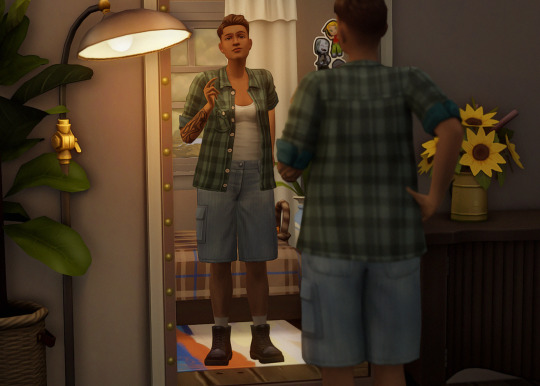
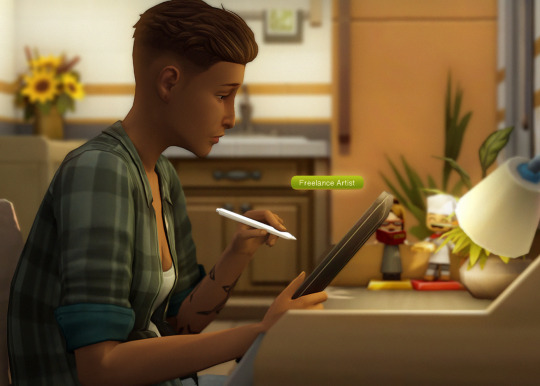
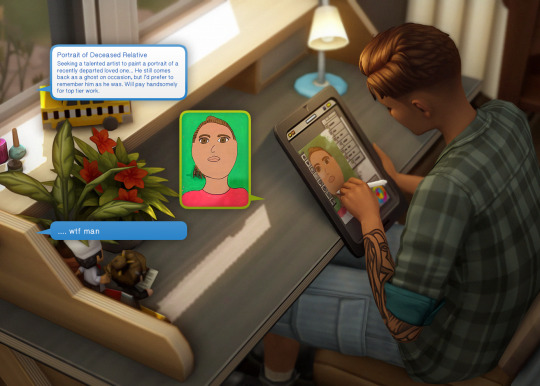
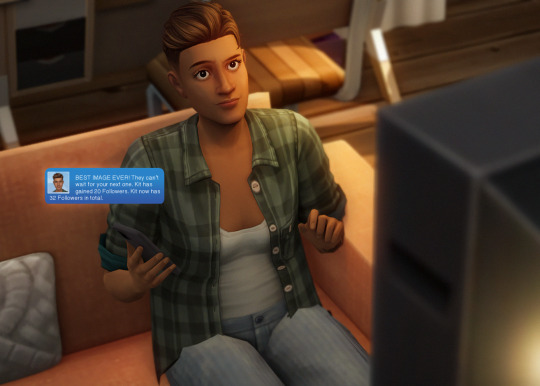
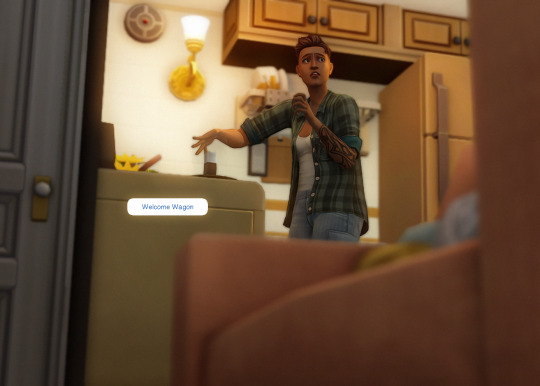
this is kit, please commission some art from them on social bunny 🙏
#ts4#sims 4#just wanted to test out relight but now i have a whole new gameplay i wanna do#my house wifi's been down since friday so i'd nothing better to do lol#assignments shouldn't exist. i should be able to play video games all day >:(#i think i'm going to remove this font replacement cus it can't do accented letters :(#i had to uninstall wickedwhims cus my uni friend wants to play sims on my laptop tomorrow LOL#anyways kits cool though#they're in the same save as virgil's tjol :)#so they might meet him!#uuughhh i fuckin hate thursdays. i'm out of the house for like 14 hours :((#going to england in 8 days tho i'm so excited to see my family again :) they got a new dog too!! a jack russell named paddy lmaooo#i got tagged in kmik posts but i'm saving them for friday night when i'm not busy <3#goodnight simblr#it's 11:50pm and i need to start writing my essay due tomorrow D:
572 notes
·
View notes
Text
Do you think after the triplets first moved in, Scrooge was just-
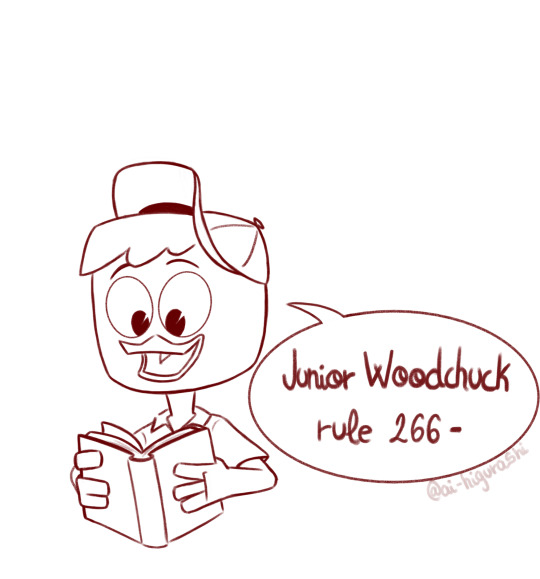
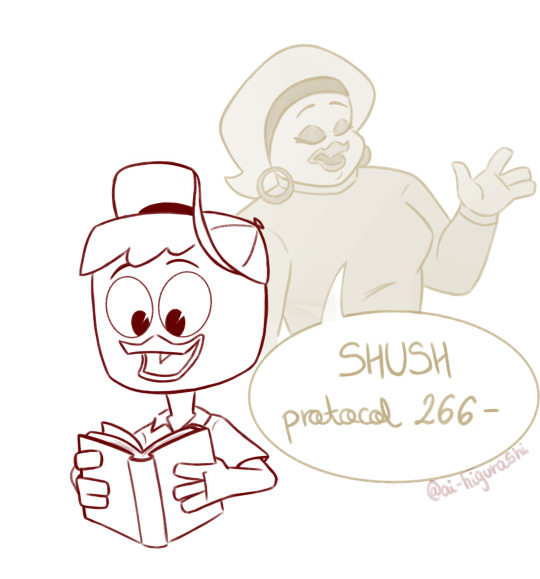
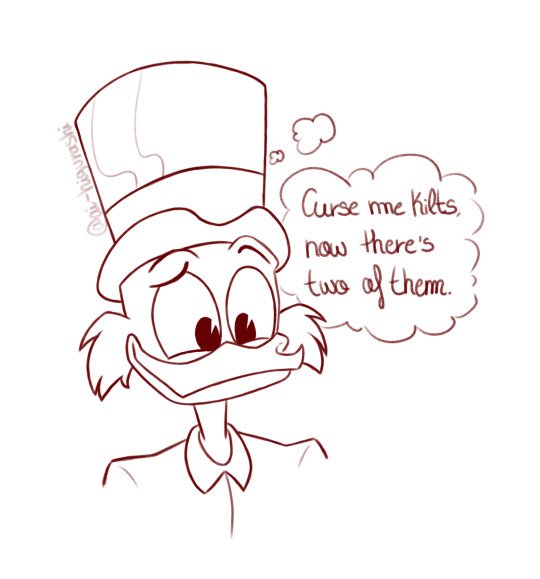
#ai's random art#bentina beakley#ducktales 2017#ducktales#mrs beakley#scrooge mcduck#huey duck#going around shaking people by their shoulders like LISTEN-#once again spreading the Beakley-triplets agenda#Beakley seeing Huey go through a similar arc as she did after meeting Scrooge like 'first time?'#I'm sorry but Scrooge definitely saw Huey with his guidebook and had a déjà vu like 'ah shit here we go again (affectionate)'#I'm just saying. Huey could definitely get Beakley to end up knowing his guidebook by heart too just by infodumping at her#have a whole incoherent essay about how they could work#OKAY SO APPARENTLY THIS IS MY 100TH POST? HUH
533 notes
·
View notes
Text
Oh good Neil Gaiman finally unfollowed me after all my bullshit I can be even more unhinged now
#It was really funny while it lasted#I think he followed me in 2018 and one day I summoned enough courage to ask him if he meant to follow me or did his son take his phone agai#He said he doesn't remember following me but then HE NEVER UNFOLLOWED after that#Can you imagine posting/reblogging everything thinking that Neil Gaiman is gonna see it. Every time I reblogged old men kissing#FOR FIVE YEARS#I'm finally free#I can post smut now -- (??#I was starting to get a little respect for him after I've done nothing but talk shit about him on my dash for a week and he didn't unfollow#Guess he finally read what I said about the season lolol#Again: I'm getting to my unanswered asks! I'm not ignoring you!#The next ask involves that one fucking 36 pages essay so...I'm still working through that......#Oh the things I do for my asks 🤦♀️
215 notes
·
View notes
Text
"Minkowski's been talking about Sondheim again…": Minkowski's love of musical theatre and what it reveals about her characterisation and her relationships
TL;DR: Renée Minkowski's love of musicals, while it might seem just like a mundane character detail, is used to give depth to her character because it contrasts with expectations of her from both the listening audience and the other characters. Her willingness or unwillingness to share this interest in different circumstances reveals her relationships with other characters at various points.
Since this is a long one, if you'd rather read it as a document, you can view it here: Google Doc version.
"She actually really cares about these talent shows": Episode 8 (Box 953)
In the early episodes of Season 1, Minkowski is presented (largely through Eiffel's unreliable perspective) purely as a strict no-nonsense authority figure without much emotional depth, the kind of person who only likes things that are useful, purposeful, or mandated by Command. In contrast, musical theatre is a creative pursuit that has nothing to do with the mission of the Hephaestus and is viewed by many people as fairly frivolous or silly. The gradual exploration of Minkowski's passion for musicals is one of the many ways that the show expands and challenges our understanding of her as a character.
The first indication that we get of her interest in musicals is through her entry into the infamous talent show, something that is required as part of the mission. Minkowski really cares about 'crew morale' activities in general, even when they actually have a negative effect on morale and even before she's friends with any of her crew (for example, the Christmas and Thanksgiving dinners in the earlier stage of the mission), perhaps partly because doing things in the "right way" is important to her.
But Eiffel senses that the talent shows aren't just about rules for her: "it’s bad enough when she makes us do something just because it’s military protocol, but I think that she actually really cares about these talent shows". This might be the first indication that we get of Minkowski caring deeply about anything that isn't inherently part of her role as a Commander. Moments like this are part of the gradual process of giving us insight into her character beyond the Commander archetype that she tries to embody. And yet, she only indulges her theatrical passion because something mandatory gives her permission, or an excuse, to let another part of herself out.
Of course, to satisfy the needs of a talent show, she'd only need to provide a performance of a few minutes. But Eiffel mentions "the second act of the play" - which along with Hera's comment that "Isabel isn't the biggest role in the play" - implies that Minkowski was intending to put on the whole of Pirates of Penzance as her talent show act, rather than a few of the songs or some kind of medley. (I suppose that Eiffel could be exaggerating or Minkowski might have been planning to do extracts from different parts of the play, but I prefer the interpretation in which Minkowski gets to be more ridiculous.)
Even though no one else would be willing to be in her production of Pirates of Penzance, Minkowski casts Hera as Isabel, a role with two lines and no solo singing. I found some audition notes for this play which said "The traditional staging gives [Isabel] more prominence than the solo opportunities of the part suggest, so she must be a good actress" which does make me sad in relation to Hera's inability to have a more significant role by being physically present on stage.
It’s sweet that Hera still wants to take part though. She tells Eiffel "Pirates of Penzance is a classic of 19th century comic opera", so either she’s absorbed what Minkowski has told her about the show, or she’s done her own research and formed her own opinions. I enjoy the fact that Hera is the one Hephaestus crew member who shows potential to share Minkowski's musical theatre appreciation; I like to think that this is something they could explore together post-canon.
Anyway, I'm obsessed with the idea that Minkowski was planning to play every character except one in Pirates of Penzance, a show which is designed to have 10 principal characters and a chorus of 14 men. It seems that her contribution to the talent show was supposed to be an entire two-hour two-act musical, with costumes and props, in which she would play almost all of the parts. This is very funny to me as the perhaps predictable consequence of giving an ambitious and frustrated grown-up theatre kid a position of authority and asking them to arrange a talent show. Minkowski knows that the audience will be made up of her subordinates who are theoretically obliged by the chain of command to watch and listen, so she absolutely tries to make the most of that opportunity. There's probably also a degree to which she limits other people's involvement in her musical because - as with her other endeavors - she wants the outcome to be almost entirely within her control (something that is usually pretty much impossible in as collaborative a medium as musical theatre).
Of course, Minkowski's behaviour in most of the talent show episode is affected by her being drugged by Hilbert. This creates an exaggerated situation which is the first real opportunity for Minkowski to be something other than the strict sensible authoritarian Commander and the foil to Eiffel's jokey laid-back attitude. I don't agree with ideas that being intoxicated brings out anyone's true self (especially in the absence of consent for the intoxication), but it seems pretty clear that being under the influence of whatever was in Hilbert's concoction caused Minkowski to fully commit to a level of manic enthusiasm for her musical production that might have otherwise been obscured by her professionalism. It's a particular kind of person who belts showtunes when drunk, and Minkowski is that kind of person, even if that's not how she wants to present herself. (As a sidenote, I seem to remember that they took Emma Sherr-Ziarko's script off her to help her sound more drunk. It's an excellent performance.)
Minkowski wants interval ice cream. She wants "pirate costumes" (and she'll threaten to shoot a man to get them). She wants "swashes and buckles". She wants whatever props she can get her hands on (including a real cannon). This show is important to her, even though only three other people will witness it and two of them actively don't want to be there. It’s important to her for its own sake.
Eiffel says Minkowski wants "a second pair of eyes to tell her if the prop sabre for her Major-General costume was a bit much…" While I certainly wouldn't put it past Goddard Futuristics to have a prop sabre on the station for no apparent reason, it feels more likely that she might have made it or adapted some existing item. Which suggests that maybe she was that passionate about the props even before Hilbert drugged her.
Even so, it does feel significant that Minkowski's love of musicals is only revealed in the episode in which she is drugged, exhibiting lowered inhibitions, exaggerated behaviour, and an "impaired euphoric effect". Her love of musical theatre is initially revealed through a professional structure that provides permission, and then further emphasised by a forced intoxication that exaggerates some impulses that perhaps she already had.
"Some hobbies other than making trains run on time": Episode 17 (Bach to the Future)
After Eiffel tells to find Minkowski to find something else to do while her work duties have quietened down, they have the following exchange:
EIFFEL: You must have some hobbies other than making trains run on time. Something to do with friends? Boyfriends?
MINKOWSKI: Of course I do, but, well, there aren't really a lot of opportunities for rock climbing or trail hiking in the immediate vicinity.
Even though this quote doesn't mention musicals, I've included it here for two reasons. Firstly, it's very funny to me that, even after the talent show debacle, Eiffel acts like he's never had any evidence of Minkowski's hobbies. She tried to perform a whole play almost single-handedly and it didn't occur to him that this might indicate an interest of hers outside of work. I think this reflects the fairly two-dimensional view that Eiffel has previously had of Minkowski, which her interest in musical theatre didn't fit into.
Secondly, it feels notable that Minkowski doesn't mention musical theatre here. She wants to show that she has non-work interests, but without undermining her own authoritative image. Her interest in rock climbing and trail hiking - while it may be genuine - fits with how she wants to be seen as a Commander. These are hobbies which portray her as physically capable, with a high degree of stamina and a willingness to adapt to perhaps less hospitable surroundings. Of course, Minkowski does have these traits and they serve her well on the Hephaestus. But there's not really anything particularly surprising about her expressing these interests. The surprise in this scene comes from the reveal that she has a husband, a character detail which - like her love of musicals - isn't something we'd necessarily expect from the archetype-based view of her we are initially presented with.
Her interest in rock climbing and trail hiking never come up again, because these details don't really deepen her characterisation (or at least, they aren't really used to deepen her characterisation beyond proving that she isn't entirely all-work-and-no-play). In contrast, Minkowski's love of musicals is brought up over and over because it shows another side of her that she struggles to reveal on the Hephaestus, and that allows more interesting things to be done with her characterisation.
"You wanted to write showtunes": Episode 35 (Need to Know)
Alongside the more high stakes discoveries prompted by the leak from Kepler's files, we also learn that Minkowski applied to - and was rejected from - the Tisch Graduate Musical Theater Writing Program.
Up until this point, we've only had evidence that Minkowski enjoys performing in musicals. But here we learn that Minkowski doesn't just love watching or performing in musicals - she wanted to write them too. This suggests a creative side to her that we never see her fully express.
The course
The Tisch Graduate Musical Theatre Writing Program claims to be the only course of its kind in the world and it accepts just 30 students each year. The current application process requires applicants to: upload play scripts or recordings of songs they've written; answer a large number of extended response questions about their creative process and views on musical theatre; write a 'statement of purpose' which has to talk about why they are applying and include 3 original ideas for musicals; provide a professional resume and a digital portfolio; complete an exercise of writing in response to a prompt; and undergo an interview. The process might have changed somewhat since Minkowski would have been applying (which, if it was soon after she finished college, might have been around the early 2000s) or it might be different in Wolf 359's alternate universe, but I think we can safely assume that applying to this course was a serious undertaking that required an intense amount of commitment and work.
Applying to a course like that isn't something you do half-heartedly or on a whim. You couldn't apply to this course if you hadn't done a fair amount of musical theatre writing already. (The course requires applicants to choose to apply as bookwriters, lyricists, or composers, but I'm not going to make a guess here as to which of these Minkowski went for.) The fact that Minkowski wanted to study this course suggests that she was seriously considering trying to make a career out of musical theatre writing. In Once In A Lifetime, she tells Cutter that commanding a space station has always been her dream job, but we've got evidence here that it wasn't her only dream job. There's something kind of funny and kind of sad about the idea that writing musicals was her back-up / fall-back career path. She does not like to make life easy for herself.
The revelation
This information is revealed against Minkowski's will. It's not something she wanted people to find out, and she isn't happy about them knowing:
JACOBI: "Dear Renée, thank you for your interest in the Tisch Graduate Musical Theater Writing Program..."
MINKOWSKI: Oh, come on!
JACOBI: (pressing on) "We are sorry to say, we will not be able to offer you a spot in this year's blah blah blah." Oh this is too good. You wanted to write showtunes?
MINKOWSKI: Number one? Shut up. Number two, why are my personal records on there?! [...] How is it in any way relevant?!
JACOBI: Oh, I think it's very relevant. I mean, if you're sending someone to pilot ships in deep space, you want to make sure that they can, you know... paint with all the colors of the wind.
Jacobi CRACKS UP - and, although to a lesser degree, so does Lovelace. Minkowski looks at her: really?
LOVELACE: Sorry, Minkowski. It's... it's a little funny.
MINKOWKSI: No, it isn't!
Minkowski seems defensive and embarrassed here. She obviously doesn't trust everyone there with this revelation (Jacobi, Maxwell, Lovelace, and Hera are all present). She considers this information to be "personal" and irrelevant and not even "a little funny". She's used to reactions like Jacobi's (and to a lesser extent Lovelace's); in Ep41 Memoria, she says "most people think it's hilarious that I like musicals" (see below for more thoughts about this quote). But the fact that these mocking reactions are expected doesn't mean that they don't bother her. She wants so badly to be taken seriously and, in this scene, her interest in musical theatre seems to be incompatible with that. Jacobi reacts the way that he does because of the idea that I've already expressed, that a passion for musical theatre does not fit with the serious authoritative image that Minkowski has often presented. It's not the typical hobby of a soldier, especially not a Commander.
To me, the way Lovelace laughs suggests that she might not have previously known about Minkowski's love of musicals, or at least perhaps not the full extent of it. At any rate, it's definitely news to Jacobi. And Minkowski clearly hasn't talked about it enough for it not to feel like a big reveal for her.
The rejection
It's notable that this reveal is not just that she wanted to write for the stage, but also that she failed to get into a course that might have helped her work towards that goal. This of course compounds Minkowski's discomfort at having this information revealed. Not only did she want to write showtunes, but she encountered rejection in her attempts to do so. This detail implies that perhaps it wasn't just the appeal of her spacefaring dream that stopped her going down a theatrical career path.
I'm about to move more into headcanon territory rather than just straightforward analysis, but I personally believe that, while Minkowski auditioned for a lot of musicals (particularly as a child / young person), she was never cast as the main role. She seems embarrassed about her interest in musical theatre in a way that (at least judging by people I've encountered) people who were always the lead in their school / college productions don't tend to be.
We don't have much evidence about her actual level of singing/acting ability, given that she is inebriated during the only time we hear her sing in the podcast. However, it resonates with other aspects of her characterisation to imagine that Minkowski was generally good enough to get an ensemble part but never quite good enough to be cast as a main part. I think she might see only ever being cast as part of the ensemble, and failing to get into the Tisch Musical Theatre Writing programme, as slightly more down-to-earth examples of the same pattern as her repeated rejections from NASA. She is desperate to prove herself. She is "someone who very much wants to matter. To do something important." When she casts herself as almost every part in Pirates of Penzance, she is finally taking the opportunity to be a main character, an opportunity which I imagine had been denied to her over and over in both a literal and metaphorical sense.
"It's just from a play I saw once": Episode 41 (Memoria)
The next scene I want to talk about is from a memory of Hera's, which took place on Day 57 of the Hephaestus mission and in which Minkowski appears to be talking about the Stephen Sondheim musical Sunday in the Park with George:
MINKOWSKI: Oh, it's just from a play I saw once. It doesn't matter. (BEAT) The guy who sings it is this famous French painter. And his entire life is kinda falling apart. But he can always turn what's happening around him into these beautiful paintings.
HERA: And?
MINKOWSKI: And... That's, I don't know. Reassuring, maybe? (BEAT) I don't know why I'm going on about this. You don't care.
HERA: I think it's interesting.
MINKOWSKI: Yeah? Most people think it's hilarious that I like musicals.
HERA: I don't see what's funny about it.
MINKOWSKI: Well, thank you Hera, but you're not exactly... you know.
HERA: I'm not... what?
There's a couple of different things I want to pick out from this exchange. Firstly, the line "Most people think it's hilarious that I like musicals" makes me sad. I don't think she's talking about people on the Hephaestus there. Judging by the quote I talked about from Bach to the Future, Eiffel definitely wouldn't have registered Minkowski's love of musicals at this stage, and I doubt Hilbert cares at all about the hobbies of his fellow crew members. So Minkowski is talking about experiences that she's had on Earth, of people mocking her interest in musicals and thinking it doesn't fit with who she is. You can hear the impact of those experiences in Minkowski's reluctance to elaborate, in the way she says that something she obviously cares about doesn't matter, in her assumption that Hera doesn't care.
Secondly, this scene is a complicated one for Minkowski and Hera's relationship. On the one hand, Minkowski freely talks to Hera about something she's passionate about, and Hera listens and expresses interest. Hera validates Minkowski's interest in musical theatre without making a thing of it being weird and Minkowski thanks her. Again, it’s shown as an interest they could could potentially share.
But on the other hand, it seems like part of the reason Minkowski feels able to open up to Hera is because at this point Minkowski doesn't see opening up to Hera as fully equivalent to opening up to a fellow human. She doesn't just accept Hera not making fun of her interest; instead it seems Minkowski is about to imply that this lack of judgment indicates Hera's difference from humans (although she does have the decency not to say it outright). Minkowski's expectation of judgment from others contributes to her saying something very hurtful to Hera here. (This kind of potential consequence of negative self-attitude is explored a lot with Eiffel, so it's interesting that Minkowski can sometimes have a similar issue.)
Minkowski and Hera's conversation is interrupted when:
The DOOR OPENS.
EIFFEL: Hey, Minkowski, we've - What are you guys talking about?
MINKOWSKI: We were just discussing how I'm going to take away your hot water privileges if you don't reset the long-range scan.
Eiffel can obviously tell that he's walked in on a conversation that is about something other than work, or he wouldn't have asked. But Minkowski actively chooses not to tell him that she was talking to Hera about musicals. Perhaps she doesn't know how to open up to a human subordinate about it. Perhaps she doesn't trust him not to make fun of her. Perhaps she just doesn't have any impulse to talk about her interests with him. Either way, if Minkowski's love of musicals is something which reflects a side of her personality outside of her Commander role, this is a moment where she chooses not to take an opportunity to share that side of herself with Eiffel. This reflects the emotional distance between them three months into the mission, which forms a nice contrast with the next couple of quotes I'm going to talk about.
"Composition. Balance. Harmony.": Episode 54 (The Watchtower)
When Eiffel comes directly face to face with alien life, he discovers that music is the human invention that fascinates the Dear Listeners:
EIFFEL: You haven't figured out music?
BOB: ORDER. DESIGN. TENSION. COMPOSITION. BALANCE. HARMONY.
EIFFEL: (low, to himself) Minkowski's been talking about Sondheim again…
I only learned in the course of writing this post that in this moment the Dear Listeners are almost exactly quoting a repeated phrase used throughout Sunday in the Park with George. The titular protagonist lists various combinations of these qualities in multiple songs in reference to his art. In the closing song, the lyrics are "Order. Design. Tension. Composition. Balance. Light. [...] Harmony." It's not only Eiffel's references that the Dear Listeners are incorporating into their speech - they've picked this one up from Minkowski. This also suggests that some element of her appreciation for musicals and the way she talks about them has fed into the Dear Listeners' understanding of the human phenomenon of music. The Dear Listeners aren't just parroting - they understood the quote enough that they left out the word "light", arguably the only quality in that phrase which isn't a big part of music as well as visual art. Eiffel likes music too, but I don't think that this is how he'd talk about his favourite songs.
This is a refrain about finding order and beauty out of the chaos and uncertainty of life, which was also the aspect of Sunday in the Park with George that Minkowski focused on when talking about it in Memoria. It suggests that art/music could be something governed by rules and principles, which is potentially something that appeals both to Minkowski and to the Dear Listeners.
Eiffel's response to this reference is one of those little hints that reminds us that Eiffel and Minkowski have spent a lot of time together and that not all of that time has involved them being at each others' throats or actively in a life-or-death situation. Some of it has just been Minkowski going on about a musical she loves and Eiffel (willingly or not) paying enough attention that he recognises this phrase as a Sondheim quote that Minkowski has talked about. I suppose that this quote might have been in Eiffel's pop-culture-brain anyway, but judging from Eiffel's general tastes and the fact that I don't think Sunday in the Park with George is one of the more commonly known Sondheim musicals among non-musical fans, it seems more likely that this quote is something he only knows because Minkowski has talked about it.
Eiffel sounds exasperated at the mention, like he's heard Minkowski talk about Sondheim far too much. But I'd argue that this still says something positive about their relationship, when we contrast it with a couple of other moments I've already mentioned. Firstly, when her previous musical theatre ambitions are revealed to Jacobi, Maxwell, and Lovelace in Need to Know, Minkowski seems embarrassed and defensive. Secondly, in the memory from Memoria, she avoids telling Eiffel that she was talking about this same musical. Yet, by the time The Watchtower takes place, Eiffel is sick of hearing Minkowski talk about Sondheim. She doesn't have the same barriers up in sharing her interests with him, even though he doesn't have the same interests. I think this is a demonstration of how comfortable she feels with him. It's a hint at the kind of easy downtime that they've sometimes shared.
"One day more": Episode 61 (Brave New World)
Eiffel recognises another musical reference of Minkowski’s in the finale. As the crew are preparing for their final confrontation with Cutter and co., Minkowski quotes Les Misérables, mostly to herself - but Eiffel recognises the lyrics and joins in:
EIFFEL: Hey - chin up, soldier. We're almost through. Just one more day, and then we're done.
MINKOWSKI: Yeah, one more day. (more to herself) The time is now, the place is here - one day more.
EIFFEL: - one day more.
They both stop, dead in their tracks.
MINKOWSKI: Did you just - ?
EIFFEL: Was that what I - ?
They look at each other: No way. And BURST INTO LAUGHTER.
EIFFEL: Man... this is really it, huh? The end of everything.
It feels really important that Minkowski and Eiffel share this moment of togetherness before she tries to send him back to Earth and before the rest of the action goes down. I think there’s some nice symbolism about them finding a way to communicate that they both understand. Making references is Eiffel's thing, and musicals are Minkowski's thing, so this is a synthesis of their two approaches. Again, there's a contrast with Minkowski's previous unwillingness to share her musical theatre passions with Eiffel (at least without the mitigating circumstances of a mandatory talent show and some kind of intoxicating substance).
I talked about the significance of the fact that they reference this particular musical in this post from ages ago. I don't think it's too much of a spoiler for Les Misérables to say that the revolution that the song One Day More is building up to does not end well for the revolutionaries. When Eiffel says "Just one more day, and then we're done", it encompasses both the possibility that the crew will escape to travel back to Earth and the possibility that they will all die. Minkowski's reference to a famously tragic musical suggests that it's the latter possibility that's at the forefront of her mind (right before she tries to send Eiffel away from the danger). But Les Misérables is also a story about people standing together in solidarity against powerful oppressive forces, which gives particular resonance to the way that this reference brings Eiffel and Minkowski together in a moment of being completely on the same wavelength as they prepare to fight Cutter and Pryce's plan.
When they laugh here, it's not about the 'hilariousness' of Minkowski's interest in musicals, it's about their unexpected unison - Eiffel's recognition of Minkowski's reference and Minkowski's surprise at the fact he joined in. It's a laugh of togetherness, of shared understanding, of friendship. It's a moment of lightness in dark times. And that moment is provided by Minkowski's pop culture interests, not Eiffel's. In spite of all they've been through, she's not lost that part of herself, and in fact, she's more open about it, at least to Eiffel.
I'll finish by highlighting what Eiffel says when he's trying to get into character to impersonate Minkowski so he can turn the Sol around:
EIFFEL: Umm... yes, this is Lieutenant Commander Renée Minkowski. I'm... uh... well I sure love schedules, and, uh, musicals. And that man, who I married…
I just think this is a nice example of Eiffel not defining Minkowski solely by her professional Commander role. Sure, she likes schedules (probably in a personal as well a professional capacity to be fair), but she also loves musicals, and her husband. It is a fairly reductive overview of her as a person, but it feels reductive in a fond way, like these things are part of Minkowski's brand to Eiffel in a way that he might affectionately tease her about. (Credit to @commsroom for this thought.) His view of Minkowski has come a long way from "our resident Statsi agent" or even just "you must have some hobbies other than making trains run on time." He doesn't see any contradiction or inherent humour in Lieutenant Commander Renée Minkowski's appreciation of musicals.
Conclusion
Minkowski's love of musical theatre is used to deepen her characterisation and is one of the ways in which we gradually begin to see her complexity beyond the strict Commander archetype. The degree to which she is prepared to share this interest at various points is used to illustrate the nature of her relationships with other characters: a general unwillingness to show a less serious side of herself; a complicated potential shared interest with Hera; and the growing understanding between her and Eiffel.
If you read this whole thing, well done / thank you 😄 It wasn't meant to be this long - it just happened… Feel free to share your thoughts!
#It's Minkowski Essay Time again!#This is over 4700 words and still doesn't cover it all...#I hadn't quite realised there was so much to say!#Wolf 359#w359#If anyone is more familiar with 'Sunday in the Park with George' and has thoughts on why it might particularly appeal to Minkowski#I'd be interested to hear#I listened to the soundtrack and read the Wikipedia plot summary#but I don't think I really got it#My other significant bit of research was that#in order to see what applying to the Tisch Graduate Musical Theatre Writing Program involves#I had to create an account as if I was actually applying#which might be the oddest thing I've done for character analysis#If it interests anyone I could do a post with more detail about that application process#cos it looks insanely intense#Renée Minkowski#Renee Minkowski#the empty man posteth#I hope no one takes things I have said here as critical of musical theatre people btw#I'm just talking about general perceptions#In general I do enjoy musicals myself from an audience perspective
179 notes
·
View notes
Text
ok well since tumblr deleted my whole tag essay on this post which i'm going to be sad about forever, i'll try to recreate it in its own post.
so the op of the post made a great point which really touched on why i've been saying that i had a fundamentally different takeaway of season 9 compared to the rest of the fandom. i have a lot to say in response to this (i mean it), not in argument but in support and synthesis of it.
fair warning: this is essentially a thesis on seasons 8-10 and how they function as a unit, through the focal lens of season 9. the length is appropriate for this argument.
i'll start with dean at the beginning of season 9: he has a great struggle in 901 regarding gadreel possessing sam, more so than any other struggle he's faced when saving sam's life, which points to me as him being aware of and conflicted about sam's history of possession. he understands this is crossing a line because it's similar to lucifer and meg, and so accepting gadreel's deal is violating sam to a length dean hasn't gone to before. dean by and large is the one who has this particular ethical problem (shown throughout the first half of season 9), not sam. hell, dean is the one who leaves sam once gadreel's out, without even waiting for input because his self-loathing is that strong.
sam, on the other hand, is more textually concerned in his 912/913 arguments with the lack of trust ("i can't trust you, not the way i thought i could") and dean's selfishness ("you did it for you"). this is an ongoing conflict sam has with dean, since the beginning of the show. dean doesn't trust sam to make his own decisions and therefore makes them for him, without sam's consent or knowledge. sam wants to be trusted to stand on his own, and he wants dean to put the same faith in him that he puts in dean. this is the core of sam's needs; the violation of autonomy is just an externalization of these needs and this conflict.
and i don't entirely disagree with the connection between going behind sam's back to keep him alive against his will and a rape narrative. both involve a lack of consent and a violation of agency. however, it really doesn't stop there, and it's a lot more complex than that.
and that's what rubs me wrong about more common interpretations of season 9 that i've seen. because this isn't really what the season is about. this violation on its own isn't the point. or if it is on the surface, it's equally about sam lying to himself about what it's actually about. he's consistently left out of major decisions regarding his own life and then lied to about it "for his own good," and he wants the right to choose his own path.
except, as we learn, that's not true. he lied about it. because the point of the whole season is that sam and dean are the same. they will make the same decisions to save each other over and over again. the point of the whole season is that sam has been lying to himself.
i said this in another post, but i think a big reason sam was able to lie to himself about this fact is because he's had the opportunity to let dean go on several occasions. he's been unable to save dean the way dean has saved sam. he fails where dean succeeds. sam has been forced to endure a grief that dean has never had to experience because dean always brings sam back. and so because sam has endured these experiences maybe he's more comfortable letting dean choose death in the abstract—the hypothetical. but in reality when it comes to that point, sam can't actually follow through, because he's just as dependent on dean being there for him as dean is dependent on sam.
and that's what season 9 is about. sam has been lying to himself about this reality from the start. this is why 1019 parallels 311 regarding how insane sam is about dean. it's reiterating the facts we've known but with a new perspective, now that sam is done deluding himself. he needs to accept that he was lying to himself and to dean, and this is what allows season 9 to close and for season 10 to begin, because season 10 is a response to sam's realization. he chooses dean over everything else in a monumental display of hypocrisy and genuine understanding of himself and who dean is to him.
seasons 8-10 should be taken as a single, cohesive unit, and the show goes to great lengths to enforce this. season 9 mirrors season 8, and season 10 acts as a response to and therefore a continuation of season 9. you can see this in the way charlie's death mirrors kevin's (one brother's lies and deceptions leads to increasing stakes that could have been avoided through honesty and openness, which culminates in the death of their beloved ally, and the deceptive brother blames himself for that death because his own unethical actions led to it), or how both of them undergo a change in their physiology as a result of godlike power entering their bodies which mutilate them from the inside and have fatal consequences (sam with the trials, dean with the mark of cain) which can only reasonably be resolved with their deaths (and they both even enter the final stages of this conflict by going to confession). also the plot structures of seasons 8 and 9 on their own mirror each other very closely.
this is all very important because it outlines the purpose of each of these two seasons. it's about them being fundamentally betrayed by their brother, causing that brother to become desperate and feel rejected and unloved, only for them to get what they need out of each other to reaffirm their love. they have to function as a unit, because otherwise both season's primary conflicts (as in, the conflicts established in the first half of each season) are left unresolved. instead, sam gets what he needs from dean in 823, which means that in return dean gets what he needs from sam in 923, thus closing the circle that was opened in 801.
dean reaffirmed that sam is the most important person in the world to him in sacrifice, that he would choose sam over every single other person on earth—this is what sam needed to hear, because it's the foundation of the conflict in season 8, since sam thinks dean chose benny over him and this sent him spiraling into a suicidal depression and self-loathing. so season 9, consequentially, is about dean getting what he needs from sam: he needs to know that sam will do anything in his power to save dean, which is a conflict that began in season 8 (with sam not searching for dean in purgatory) and is reasserted in 913 when sam tells him that he wouldn't violate his agency if the situations were reversed.
and this is exactly what dean gets in 923, when sam says he lied about all of that. dean gets the affirmation that sam's love for dean goes beyond petty ethics, which translates to "dean is more important to sam than anything else in the world" where the "anything else" includes sam's own moral boundaries. this is important to dean because dean eschews his own moral boundaries for sam's sake and safety over and over again throughout the series, and this is a major source of his own character development (see: 122, 203, 214, 222, et cetera et cetera). sam repeatedly denies that he's the same way, and has proven at least once that he wouldn't do the same, so this is an important affirmation for sam to give and it's why dean had spiraled into a suicidal depression and self-loathing (look, another parallel).
so season 8-9 are mirrors of each other, and they have to be mirrors of each other in order to work structurally and for any of the conflicts presented to be resolved. season 10 then is a response to this which shows the consequences of those dual resolutions: aka, sam acts just as unethically as dean does in the rest of the show, except this time knowingly and intentionally instead of subconsciously as he has been doing up to now (see: 1001, 1003, 1004, 1018, 1020, et cetera et cetera).
in order for all of this to work, the conflicts in season 8 and season 9 have to be equal. i.e. dean has to violate sam and his ethics as badly as sam violated dean and his ethics. it also has to be suitably Bad because it's revisiting a conflict that's existed in various iterations across the entire show. this is why it's also deeply important that 923 dean's death also parallels 222 sam's death, because it highlights how this conflict has always existed and how sam and dean are similar to each other. they both make the same choices under pressure and go to equally unethical lengths. which is why season 9 couldn't end until crowley told the audience that sam was trying to make a deal with him to bring dean back to life, specifically after dean begged sam to let him die. the point, then, was never about the violation itself: sam disregards dean's right to choose death just as much as dean disregards it. the season is about how sam and dean are at their cores the same, and it's about sam becoming aware of that reality and then actively, consciously choosing it. which is what sam reiterates across season 10, as a response to his choice in 923.
he only realizes that this is a Bad Thing in 1101 (i.e. after the response has run its course) when he says they both have to change. and the "both" is important because they are the same, fundamentally. sam isn't innocent of this violation of agency and obsessive deception of his brother, and he needs to understand that before actionable change can be made, which is what season 10 is all about.
and there's something poignant that can be said about 1023 being titled "brother's keeper," because this episode is about sam playing the role of brother's keeper, only for it to blow up so spectacularly in their faces that it causes the apocalypse 2.0. it forces sam to recognize that his original conclusion (that dean was right, and that he was lying) was not actually the correct and moral way to continue living. the significance of 1101 only reveals itself in the foundation laid by seasons 8-10, because these are the seasons about sam discovering just how down bad he is for his brother and accepting it wholeheartedly. season 11 then seeks to fix what seasons 8-10 broke, which is of course the entire fucking planet.
and this is the problem: the first apocalypse was caused by the absence of love, and the second was caused by too much love. their love is a destructive force that has world-ending consequences. that's the point of these seasons, what it all comes back to. in receiving the exact type and strength of love they needed from each other, they ended the world. and this is the conflict they need to resolve in season 11, or at least try to. because their love for each other can, has, and will destroy the world, over and over and over again. this theme can't exist unless seasons 8 and 9 mirror each other, unless season 9 is about sam's hypocrisy.
without that world-ending love, they couldn't have started the second apocalypse. if sam weren't a liar, he would have respected dean's choices, and he would have let dean die. if sam truly cared about bodily autonomy, dean would have died in 923 when he begged sam to let him. but he doesn't; that's not the point of the narrative. of course the violation of autonomy is important, because it provides the foundation for the conflict. but the violation is itself a metaphor, a triple whammy of symbolism: the possession is a metaphor for violation, and the violation is a metaphor for betrayal (as seen through the lens of deception).
the point of season 9 is not that dean metaphorically raped his helpless little brother; rather it's that the violation of agency goes both ways, and sam is a hypocrite for trying to maintain his autonomy while stripping it from dean. it's a continuation of season 8, which thus compacts his guilt over "abandoning" dean in purgatory and his self-loathing and fears of not being good enough or worthy enough of dean's love, which thus causes him to act recklessly and injuriously toward himself and dean. it's not a positive conclusion by any means; like i said, this is what causes the second apocalypse, and it's only after they've ended the world twice that sam finally sits down and says maybe they were wrong about this whole thing. maybe their love is too destructive.
in 912, sam says: "something's broken here [...] we don't see things the same way anymore."
in 1101, sam says: "this isn't on you. it's on us. we have to change."
sam goes from blaming dean to blaming both of them, because he realizes that they're both equal partners in their toxic, fucked up love. season 8 and season 9 allowed them to become equals by giving each other the affirmations they desperately needed to achieve true enmeshment, and season 10 is the consequence of that unhealthy relationship.
the point was never that dean violated sam. he does that over and over again throughout the series without destroying their relationship. the point is that sam is willing to violate dean all the same, and he had to face that reality head-on and accept it to resolve the conflict between them and give dean the affirmation he needed, just like dean gave sam the affirmation he needed in 823. the violation was simply a vehicle through which the conflict could come to a head, and the most provocative symbol this show could possibly use was the metaphor of sexual assault and rape, given sam's history with it via meg and especially via lucifer.
i've probably written enough now. the tl;dr is that season 9 invokes what can be interpreted as a rape metaphor not to vilify dean or even really to continue sam's ongoing rape narrative (though the violation that occurs in season 9 uses this as a foundation for the conflict and that's important to understanding the gravity of the situation), but rather to give appropriate stakes to mirror the primary conflict of season 8 and provide grounds for dean to get resolution for the conflict that began in 801 and continued through 923. god i hope this makes sense because now i've written this essay twice and i'm so miserable because of it.
my apologies if any of this is repetitive or meandering or lacking in any way; i tried really really hard to recreate my original essay and also provide more evidence and groundwork for my argument but obviously i'm sure i've missed some details and overlooked structure in many places. not that i even really expect anyone to have read this far. if you did, i love you and please talk to me about seasons 8-10. i'm losing my mind
#supernatural#god strike me down i can't do this anymore#i just want this to be over#at some points i feel like i sound overly critical of sammy and i want to stress i am a samgirl and he's everything to me#and i also don't think this trio of seasons vilify him either even if my arguments might sound that way#i think his development across these seasons are fantastic even if they aren't all rainbows and sparkles. he's a great character#since the essay was originally a response to the first linked post it addresses the issue with the 'rape narrative' reading of s9#more heavily than my other arguments. so yeah that's probably why i'm worried it comes across as more critical than i intended#also calling someone a hypocrite is a rather loaded term even though i'm using it neutrally. but i digress#ok i'm posting this now. i'm done with this. end me#praying to god i don't have to open this again and make edits. PRAYING TO GOD#.txt#the winchester gospel#spn posting
21 notes
·
View notes
Text


Periodically think about these descriptions of Bane from 3e Faiths and Pantheons that feel distinctly like elements of Gortash's look in the game. I have to imagine that this is intentional, but it does make it stand out that Bane's avatar is a young man. It feels like an aspect of self-styling that's endured from a much younger age and is reaching its limit, becoming more and more worn out... there's something a little pathetic about that feeling of clinging, isn't there? Evoking the image of this boy-god at such an age? I said the mid life crisis thing last week as a joke, but ahaha, perhaps it's really not. The gap between an aging human with limited time and pristine, unchanging divinity... I find it interesting. Obviously you have two older men in the canon Chosen, but Ketheric unquestionably wears his age with the dignity of a proud patriarch. He dresses as himself, not in the image of a youthful avatar. Perhaps I simply like the contrast evoked by reading this as a form of insecurity or a symbol of power once-potent wearing ever thinner as it reaches its limits.
#I hope I never make another post that's just about that guy ever again. my brain is possessed by a vile curse#I can't believe I'm making a post that's just like 'yeah the slutty v neck and guy fieri shirt are like totally religiously significant'#my spirit endures such indignities#I think about the ages of the Chosen a lot for some reason. shoutout to my friend who got the Orin essay#time for me to fucking sleep#I'm going to overcome my fears of potentially being perceived and tag these things properly. bravely. for organization and blacklist.#bg3#enver gortash#so sayeth emi
17 notes
·
View notes
Text
I put on the Empire Sibling Mighty Vibes for the first time in a while in honor of the first day of class and can we please have more Mighty Vibes. I'm begging. I love them so much.
#also I know we all know I'm a fucking nerd but oh my god I am so glad I'm in classes again.#I know there's that post about 'you don't actually want to write essays' but I really do. I really really do.#I don't think I properly processed how much my brain specifically LOVES the structure of school and semesters/quarters until now#like I SUSPECTED but knowing and Knowing are different things#anyway love doing readings that are just like “okay but do you *actually* know the definition of this basic word”#and the answer is no. and it is never straightforward. and I love it so much. this is the kind of bullshit I live for.#everything is so deep and it is the best.
41 notes
·
View notes
Text
i'm sorry i'm not being fun enough on my personal blog which is the only place on the internet i get to just be a person and not have to be professional because it's the only place my colleagues and employers don't follow me but also i'm not sorry because sometimes being grumpy is part of being human and i'm so goddamn tired of having to perform perfection on the internet
#personal#like. yeah. on a good day i would have given a longer and more thoughtful response to the arthuriana ask#but also sometimes you hit a point where you're like. i've said this. i've written this post. it's in the tag already#i don't know what more people want from me that i haven't already given. i can't keep writing the same essays again#i'm not mad at the asker but i also can't do Free Academia On Demand at all times you know?#particularly when arthuriana isn't even my area of research specialism#i am pretty much always happy to answer ulster cycle asks because i always learn something from researching the answers#(or i already know the answers so they're very easy)#but stuff outside of that just feels like work after a while and sometimes i do not have the spoons#i am very glad of cicelythereaper's response. i recommend reading that one.#i'm sorry i couldn't be the one to give it on this occasion but lads. i am so fucking tired#i have so many jobs i have so many chronic illnesses i am so behind on everything in my life
22 notes
·
View notes
Text
When you're writing an essay and the Tumblr app reloads and deletes half of it so now it's never getting done because your motivation is completely shot and you already spent an hours worth of spoons you didn't have on it :)
It's incredibly upsetting and exhausting
This has happened to my last three essays. at this point my writing motivation is shot. I can't do it anymore. Idk when I'll get back to writing essays but writing a bunch of stuff only for it to disappear genuinely takes so much outta me.
Sorry.
#I'm really sorry I was like ten seconds from posting the George essay but then it deleted#and I genuinely don't have it in me to write it again#im already frustrated#so it's not happening#and I probably won't come back to it#srry#I'm pissed too#buti have so much other work to do#I don't have the time or the spoons to rewrite that whole thing#this happens so often#and it's very upsetting#that's why I haven't been posting lately#I'm probably gonna be off for the rest of the day#bye
29 notes
·
View notes
Photo

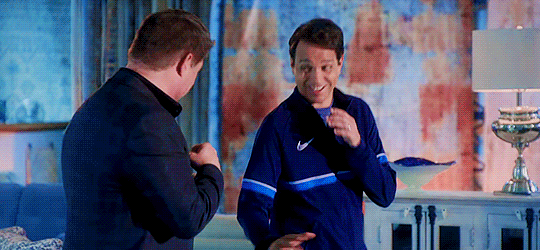
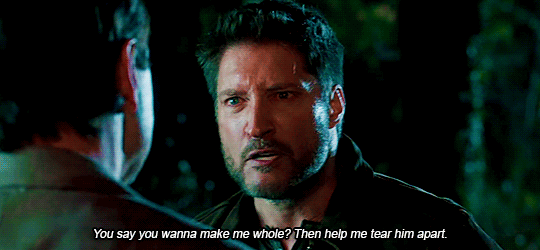
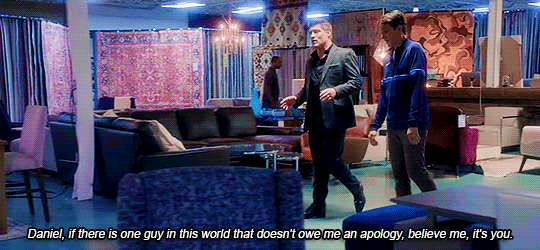
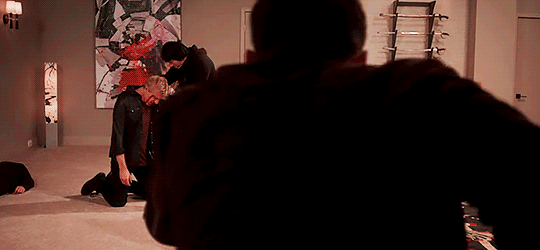

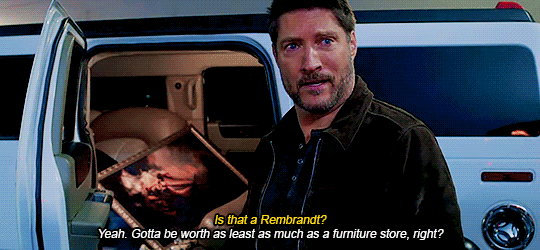
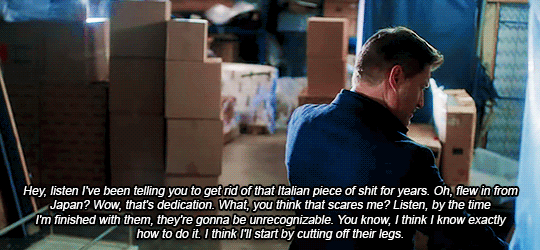
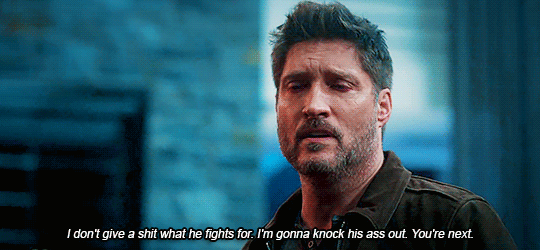
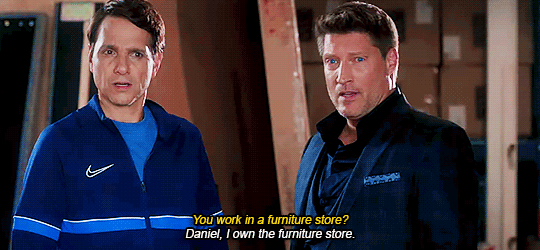
man, i have wanted to apologize to you so many times. i—i guess i was worried that it would've triggered something, or whatnot? you know, thought maybe it was just best to leave the past where it is.
#cobra kai#cobrakaiedit#mike barnes#daniel larusso#chozen toguchi#for like. a frame. shut up.#ck spoilers#s.gif#eh fuck it lets tag johnny too#johnny lawrence#flashing tw#he was so fucking normal. i can't get over it.#funniest fucking bit this show has ever done.#kreese and terry willing to commit murder on day one and mike barnes was just some fucking guy.#do you understand. he's just some fucking guy.#god. i mean. he then does a mountain of coke and you know. home invasion. but before that. he was normal.#i had this gifset tagged and ready and then tumblr glitched and i had to do it again. homophobia.#okay now that i'm at the end of an essay of tags that most people have given up on#on a gifset i'm posting at 10. can i admit. i'd fuck him. i know the dick is insane.#okay bye
308 notes
·
View notes
Text
why does consuming content destroy me. i am so bad at this. why can't i just read books and play video games like a normal person
#e#i'm sorry for this but i never make posts with essays in the tags so bear with me for once#every time i find a new Thing it eats me alive until i can forget about it#after i finished earthbound i cried for 2 days straight. u think i am exaggerating but i am not... it was scary. i could not stop bawling#when i read the locked tomb series i was literally emotionally destroyed for a whole ass month#while i had the books out from the library i just kept reading them. and rereading them. and rereading them#and i read really fast so i probably read each book like 5 times at least. and the emotional parts i read over dozens of times#anyway this time my Thing is lore olympus. i read all of lore olympus in two days and now i don't know what to do with myself#(ok to be fair i was caught up in like 2021 but it's been a while so i had to start from the beginning again)#side note: i can't wait for alecto to come out so i can be completely destroyed for the rest of my life
19 notes
·
View notes
Note
Please what’s the moomin reference I’m dying to know
Context: [Link 1, Link 2]
*breaths deeply in two year long hyperfixation* wELL
I've tried to write this post a Few times without going into a full essay about what moomin is, as that's Not necessary for answering the question. however, I am unfortunately me and this is the Writes Essays Blog. so I've simply decided I will be a nuisance instead.
but the plus side is that I've been thinking about writing about some of my other fandoms here for a while ! so, for a crash course on the franchise:
“moomin,” “the moomins,” or “moominvalley” is a franchise originally stemming from first novels and then comics written in the 1940s-50s by the finnish author tove jansson, which has since ballooned with Many adaptations and other such goodies (like themeparks and games).
it’s most popular adaptation is hands down the 90s anime adaptation ! which took tove’s charming designs and calming atmosphere and kicked it up to 11 with a long-form slice of life series
youtube
but all versions have their own particular flair and tone, even two versions created by tove herself are Very different. with the comics having a focus in on the absurd and comedic and the novels, while certainly Having those elements, also focus in on more serious themes and melancholy!
(here's a brief rundown for the differences in the adaptations for anyone interested ! [Link])
of course, moomin was a relatively unknown entity in the us because it never officially released here, but there was a brief boom here on tumblr in 2019 thanks to the release of a new adaption (called moominvalley)!
it was a perfect storm for a couple reasons:
1: while it can be a bit difficult to track down the series in the us, the Characters are all extremely accessible. with their designs alone you can pick up on who and what the main cast are both Quickly and Scarily Accurately, with the fandom largely rising Before most people had found access to the content itself flkjfdaskjkjl
they're Incredibly Simple characters that still lend themselves well to complexity. they aren't blank slates in the slightest, but they're easy to Bend and reimagine and flesh out. which is really appealing to fandom spaces!
2: having multiple different fleshed out iterations to choose from meant that if you looked you could most likely find something that suited your taste! (it'd be an incredibly accessible franchise if they'd actually make their content Accessible world wide)
3: this is Especially relevant in how the franchise can act as both escapism and catharsis. the 90s anime especially is a comfortable cottage-core fantasy to sink yourself into and forget the woes of real world (something that was about to become Very relevant in 2019), but the novels were specifically written for an audience that was actively living through war.
and while tove never wanted to make the franchise Dark or Gritty, she wanted to create a series that could help children process and come to terms with some of the feelings they Would realistically be experiencing. one of the very first novels is "Comet in Moominland," where a great comet is coming down to crash into the earth. it still engages with comedy and with the absurd, and of course nobody Dies, but it was very intentionally trying to create an accessible outlet to understand Tragedy and Fear. among lots of other things ! and this is, of course, tempered with the warm comforts of friends and family and community.
I think there's a lot to be gained by sifting through this franchise Now honestly. something that can both Distract from the bleakness and help process it, with a certain gentleness either way.
4: tove jansson was an Incredibly queer woman, and this absolutely bleeds into her work and the adaptations that followed!
while inspiration isn't an Exact one-to-one, tove Has spoken about her inspirations for her characters before. moomin (the character) draws a great deal from herself while snufkin, moomin's "best friend" and a funny little beastie, draws from her lovers both in personality and in relationship to moomin!
a big inspiration for snufkin was a man who had nearly been her husband, a vagabond and a socialist for that matter. the official moomin site (which is cannot stress enough, is representative of the franchise itself and heavily curated) describes That as follows [Link]:
In many ways the relationship of Moomintroll (Tove’s alter-ego) and Snufkin describes the relationship between Tove and Atos. Moomintroll admires Snufkin who still is quite distant and very often Moomintroll is also experiencing a deep sense of longing and yearning when Snufkin is leaving to his adventures or choosing to be at peace with his own thoughts. Moomintroll tries to understand Snufkin’s desire for freedom, even though the waiting is not easy.
Just like Tove admired Atos and just like Tove waited for Atos, his love confessions and commitment.
[End transcription]
but it was Also based, in part, on the woman who was her wife in all but legality. [Link 1, Link 2] Having met some time 1956 and having stayed life long partners until tove's death in 2001.
they'd built a home together on an island where they'd go to stay every summer, enjoying their own travels and adventures along the way !
come winter, moomin would pine for snufkin as he made his yearly travel down south, but the spring and summer months would always bring snufkin's return! and all the love and warmth that came with him uwu
How exactly that bleeds through in the franchise itself is well. Extensive. picking literally any iteration and trying to lay out, in full, the queer themes present would be an essay longer than this one. so instead have a small selection to illustration the point:
[Link 1, Link 2, Link 3, Link 4, Link 5, Link 6]
now, naturally, this was (and is) queercoding rather than explicit representation, but this was a queer woman pushing the boundaries of what was allowed to Be in children's media starting in the 1940s and onwards.
there's something About a woman who lived a full and happy life with the woman she loved, pouring that love into her life's work to create a foundation of care and acceptance for the generation that'd come after her, only to see a resurgence of queer teens See her and say what she wasn't allowed to out loud.
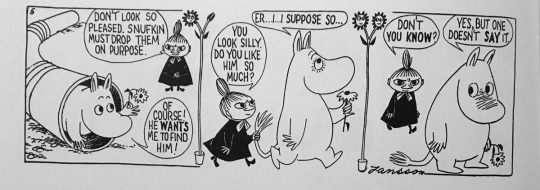

which brings us to !
5: the general blanket of pure acceptance radiating from the series.
that's not necessarily anything New for a children's franchise, but in combination with everything else it creates an environment for an absolute comfort series. this fragment of an article about the series has far and away wormed it's way into my mind in some irreversible way (and that's quite a good thing) [Link]:
In most fiction, family is what you escape from if you want to fulfill yourself. For Jansson, family is a place of tolerance, where we can fail and become ourselves. Her experience of growing up gay is there in Snufkin – who is all the more loved for being different. Like the prodigal son, everyone is so thrilled to see him, no one ever asks him where he has been. It’s there too, in Too-Ticky, Jansson’s portrait of her partner. And above all it’s there in the wonderful story where Moomintroll is transformed into the bug-eyed King of California, and his mother recognises him straight away.
[End transcription]
the quickest and most accurate description for this series, this franchise as a whole, that I could give is Warmth.
that's not to say that it's All roses. tove herself was an icon, but moomin company is a Company in charge of a franchise in the same ball park as disney properties. but considering there's no way to legally support moomin in the states I'd say the morality of engaging with it on that basis isn't exactly the most pressing of issues.
now with all of That out of my system: the actual information relevant to the comparison.
one of the stories in moomin (the novels, the 90s anime, and the 2019 adaptation, though I'm most familiar with the latter) is "The Invisible Child." [Link]
it's the story of ninny, an invisible child that moomin and co find and bring into their home to try to figure out Why she's invisible and how to fix it.
as we come to find out, ninny went invisible and lost her voice (even the ink on paper she tried to write on going invisible) because she'd been made to Feel invisible through the neglect of her aunt.
the moomins help ninny find her confidence again, with small aspects coming back to her as they make progress and regressing as they make missteps. but the ultimate point is that she needs to feel Seen and Heard.
that feeling of not having a voice, of not having a Presence, taking on the form of a Physical curse of invisibility.
it's a concept that meshes Extremely well with tommy's situation, even Without the headcanon.
#moomin#long post#did I write an entire essay when I could have summed it up in 5 minutes?#Yes Yes I Did#I'm not sorry and I will do it again ❤️#moomin fans feel free to add onto this
198 notes
·
View notes
Text
[[ok gang i am genuinely so sorry to be doing this literally RIGHT before the end of the event but i've got a whole buncha stuff lining up irl that i am starting to reeeaaally need to address/prioritize and there are a couple things that i still want to do for the "finale" here that i haven't had the time to set up, so all of this is to say iiii need to take at least a day or two to Slow Down And Chill for a bit
I haven't entirely decided if this means I'll take a full break like i have been for the weekends or if I'll just post a little less than I have been, it depends on how I end up feeling really. I will absolutely try my best to make up for the days I've missed tho! I have something pretty cool planned that I think has the potential to be pretty fun, just like i said I gotta set things in place first haha]]
#ooc#i was gonna work on a whole buncha things today but i. UGH. ended up hanging with my roommates instead 🙄#and ive actually been uh. yeah maybe a little Unwise with all this & working on it real late into the night and i am feeling it Catch Up#i'm really really hopeful that the stuff i need to set up shouldn't take more than like a day or two#and then maybe i'll still post a lil extra just to make up for it lol#but with about a million final projects (if i never have to write another fucking essay again i will ascend to the heavens) coming up-#- i am being forced to think maybe i will prioritize sleep a bit. for like a day at least#again i am sooo sorry and tbh im apologizing more to myself than anybody else so dont actually worry. but AUGH WE;RE SO CLOSE COME ONNNN#ahem. yeah you get it lmao ty for being such a cool audience so far <333333 i will return SOON!!!!!!!!!!
11 notes
·
View notes
Text
very curious if our society (youtube) has evolved to producing twenty-four-hour length video essays yet. bc ik on average the video essays i watch tend to be around an hour, some shorter some longer but this is my preferred length, 2-3 hours is on the longer side for me but if it's a topic i'm into or a creator i like i'm down for it, longest i've personally watched is 5-ish hours (tho that one was broken up into a lot of smaller segments and not meant to be consumed in one sitting) but i know for a fact there are much longer video essays out there. the longest i've seen in my recommended is eleven hours but i know there must be more out there. what is the video essay event horizon? have we reached "videos of nerds (complimentary) infodumping about niche topics which would take an entire day nonstop to consume"
#yes i am a video essay enjoyer if you couldn't tell#longest video on my ''favorite video essays'' playlist is ''understanding snapewives'' by biz barclay which is just under 3 hours#(10/10 recommend even outside of the fandom history there's a lot of fascinating stuff about religion and how we connect to media)#(and it's very well researched)#i think the longest i've watched is babbity kate's deep dive into the american girl doll ''kirsten''#which covered every piece of kirsten media ever created and analyzed the historical accuracy#kate's planning on doing a series like this for every american girl doll in release order which i'm excited for#i didn't even like kirsten as a kid but the video was very well done and engaging even if you're not as big of a doll fan as she is#longest i've had recommended to me is ''a brief retrospective of the simpsons' golden age'' which is ELEVEN HOURS#but i'm very tempted to watch it bc i am a simpsons nerd and it seems to be divided into smaller essays season by season#i think i saw a tumblr post about a fnaf lore video essay that was ridiculously long but idk if that was longer than 11 hours#i should also make a poll about preferred video essay length bc idk if my opinion is the majority#most of my favorites are 45 minutes to 1 hour 30 minutes. if it's too short (like less than 20 minutes) i'll skip it#(unless it's a creator i like who wanted to put out something short between big projects)#and if it's too long (over 3 hours) i have to be in the right mood even tho it'll probably be multiple sittings to finish it#(again unless it's a creator and topic i like and it's something i've been waiting to hear their thoughts on)
14 notes
·
View notes
Photo

[ID: a drawing of the narrator from the stanley parable and dr pierce from superliminal, both from the chest up. they are both drawn as fat older men, but the narrator is in grayscale, with short slicked back hair, wearing a shirt, vest, and tie, and dr pierce is colored with purples and oranges with slightly longer curly hair, wearing a shirt, tie with a constellation pattern, and coat. the narrator is smiling in a mischievous way, and dr pierce has a nicer smile. end ID]
i think these two should be friends and maybe even lovers- [scribbles out that last part] but um i have google docs open and i am writing an essay about how superliminal and the stanley parable are similar but opposites and same with dr pierce and the narrator, and the Conclusion i am working toward is that the silly old men should date.
#the stanley parable#superliminal#the narrator#dr glenn pierce#guy who has only played superliminal when it sees another video game: wow im getting a lot of superliminal vibes from this#i would slash j but i have screenshots from superliminal that could pass as tsp screenshots and vice versa#i am also dedicating a portion of the essay to say that while the narrator and dr pierce have certain big parallels for why im comparing-#them specifically . the superliminal character most similar to the narrator is the standard orientation protocol (SOP) ai#and i HAVE to say for the record that i love SOP with all my heart and i love her and dr pierce's friendship so bad#i think about it all the time they play CHESS TOGETHER FOR FUN#they make me unwell!!!!!#also i need anyone reading this to understand i was NOT kidding when i said i have google docs open for an essay#that is how deep into this i am#i have prepared Screenshots and Quotes ive done Research#superparable#< thats what i titled my essay and im using that if i ever post about this crossover again#ok i'm gonna hit post before i start making the essay in these tags thank you goodbye
479 notes
·
View notes